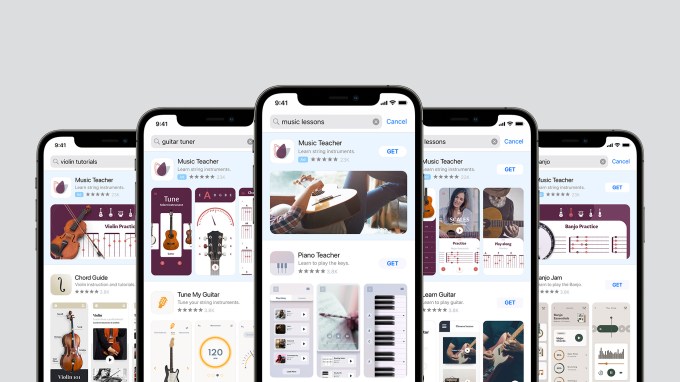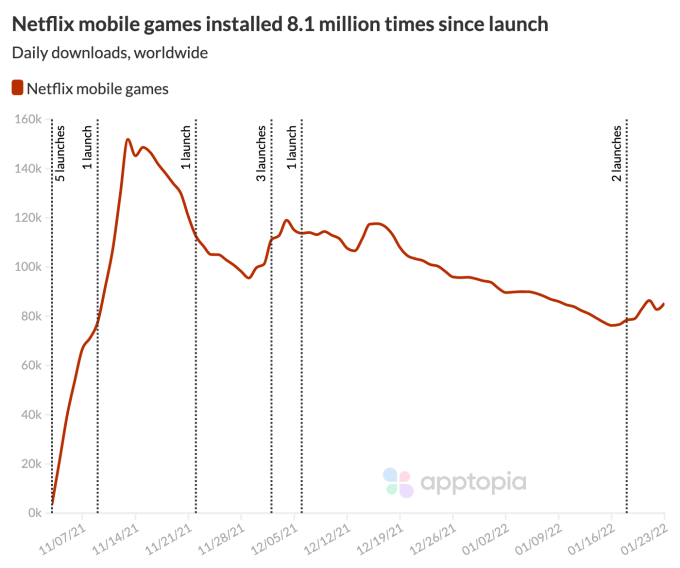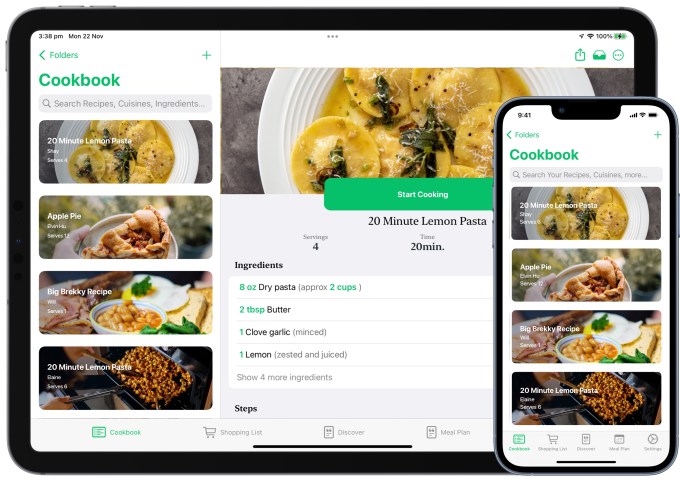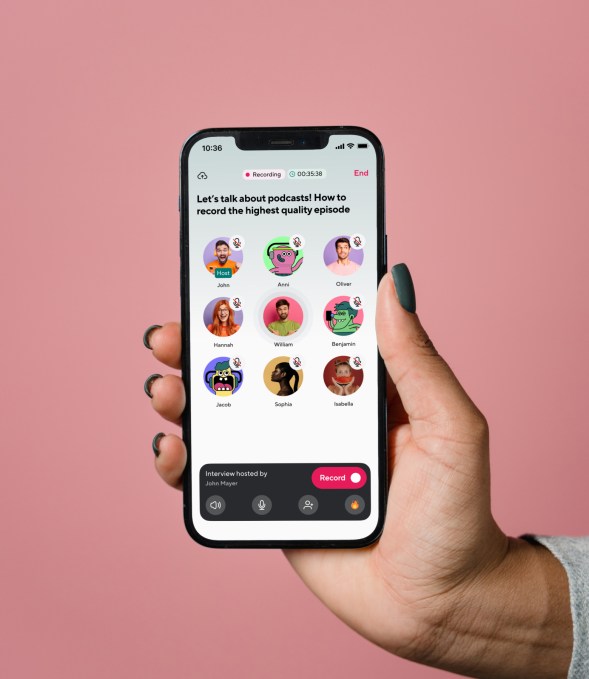This Week in Apps: iPhone payments, App Store upgrades, Snapchat’s AR shopping
Welcome back to This Week in Apps, the weekly TechCrunch series that recaps the latest in mobile OS news, mobile applications and the overall app economy.
The app industry continues to grow, with a record number of downloads and consumer spending across both the iOS and Google Play stores combined in 2021, according to the latest year-end reports. App Annie says global spending across iOS, Google Play and third-party Android app stores in China grew 19% in 2021 to reach $170 billion. Downloads of apps also grew by 5% reaching 230 billion in 2021 and mobile ad spend grew 23% year-over-year to reach $295 billion.
In addition, consumers are spending more time in apps than ever before — even topping the time they spend watching TV, in some cases. The average American watches 3.1 hours of TV per day, for example, but in 2021, they spent 4.1 hours on their mobile device. And they’re not even the world’s heaviest mobile users. In markets like Brazil, Indonesia and South Korea, users surpassed five hours per day in mobile apps in 2021.
Apps aren’t just a way to pass idle hours, either. They can grow to become huge businesses. In 2021, 233 apps and games generated more than $100 million in consumer spend, and 13 topped $1 billion in revenue, App Annie noted. This was up 20% from 2020, when 193 apps and games topped $100 million in annual consumer spend, and just eight apps topped $1 billion.
This Week in Apps offers a way to keep up with this fast-moving industry in one place with the latest from the world of apps, including news, updates, startup fundings, mergers and acquisitions, and suggestions about new apps and games to try, too.
Do you want This Week in Apps in your inbox every Saturday? Sign up here: techcrunch.com/newsletters
Top Stories
The App Store’s bad press cycle
There was a time when developers were too scared to say anything bad about Apple’s App Store for fear of repercussions to their own apps. That time has long since passed. Apple is under regulatory scrutiny, facing investigations and engaged in lawsuits over its App Store and its alleged antitrust practices, according to some authorities. Meanwhile, because more are open to pointing out when the App Store makes mistakes, it seems as if those issues are more common and frequent. In reality, Apple may have made just as many mistakes in the past, but they were only discussed in backchannels, not publicly on the web and social media. For the developer community, the stories that emerge from this closer look into the day-to-day goings-on of the App Store can be disheartening. Every week, it’s something new.
This week, for example, one story highlighted how Apple approved what was described as a shameless clone of the popular game “Unpacking,” even allowing the clone (“Unpacking Master”) to reach the top of the App Store’s free charts before its removal. The developer has since apologized, but this latest event comes only days after a number of developers tried to game the App Store with clones of the popular web game Wordle. These incidents seem to convey a message to the community that if you don’t have an iOS version of your app or game, you’re going to get knocked off — and your brand could suffer.
Elsewhere, another developer called Fanhouse decided that it would now punish its own iOS users by jacking up subscription prices by 50% in order to cover its App Store commissions. An outspoken critic of the commission structure, the company, of course, wants to collect fees through its own website, but isn’t allowed to point to that option on iOS. This is also the type of incident that would have never been heard of in such a public fashion years ago. The changing regulatory climate has allowed smaller developers to speak out about how they want altogether different rules, not just a price cut for registering as a small business.
Apple’s new plan for contactless payments
Is Apple preparing to more directly take on Square and other companies that help small businesses process payments? That’s the latest report from Bloomberg this week, which claims Apple has been working on a new feature since 2020 (following its Mobeewave acquisition) that would turn the iPhone itself into a payment terminal. The feature would involve NFC technology — meaning customers could tap their credit card to the iPhone to pay, instead of using an additional piece of hardware, like a payment terminal or simpler card reader. There are questions as to how this feature would operate. If Apple were to allow third parties to tap into the feature via an API, for example, it could boost the entire iOS mobile payments ecosystem. If, however, Apple decides these payments must only flow through Apple Pay, then it will be setting itself up as a competitor to existing payment providers and businesses serving the small business market — but at the risk of further regulation.
Apple didn’t respond to comments, Bloomberg’s report noted — and of course, we won’t know anything for sure until it’s officially announced. The timing is ripe for such a shift, as the pandemic has prompted increased adoption of contactless mobile payments in markets that had been slow to make the transition, such as the U.S.
App Store Upgrades
The App Store got a number of notable updates this week to APIs and Search Ads and more (see below). But one new feature stands out as a much bigger improvement: Apple has launched a new App Store feature that will allow developers to distribute “unlisted” apps within the App Store.
To be clear, this is not really meant for distributing betas for testing purposes, which will continue on TestFlight. Nor is it meant for widescale enterprise distribution of apps to an employee base. Instead, the feature can be used to publish unlisted apps, including consumer-facing apps, that are meant for more limited distribution. This could include those apps intended for a limited audience, says Apple, like those for “specific organizations, special events, or research studies.” The feature could also be used to distribute apps to employee-owned devices that can’t be managed through Apple’s School Manager or Business Manager platforms, which would aid organizations that have BYOD policies or lack enterprise distribution infrastructure.
Unlike public apps, the unlisted apps won’t appear on the App Store in category listings, recommendations, charts, search results, or, really, anywhere. Instead, the only way to get to the app’s download page will be with a direct link. It will be interesting to see how this feature ends up being used by businesses and other organizations, and how strict Apple will be when determining whether or not an app is eligible for unlisted distribution — a process that requires approval. There are many cases where developers want to test an app with a wider audience but bump up against TestFlight’s limit of 10,000 external testers. Will Apple finally allow these broader tests to have App Store distribution, too? Time will tell.
Weekly News
Platforms: Apple

Image Credits: Apple
- Apple upgraded Search Ads to support custom product pages. Now developers can create up to 35 additional versions of App Store product pages in order to showcase different app features, content or promotions for given search terms. These pages can also be integrated with Apple’s Search Ads, so they can be used as ads that appear at the top of search results on the App Store.
- Apple extended the in-app purchase exemption for developers impacted by the pandemic, in select apps. Specifically, Apple will continue to defer its App Store Review Guideline 3.1.1, which requires apps offering “paid online group services” to do so via in-app purchases. The impacted developers — whose original business models were built around in-person events, not virtual ones — have been able to forgo Apple’s requirement to use its in-app purchase system during the pandemic. This includes one-to-few and one-to-many services, like online seminars or group yoga classes.
- Apple updated the App Store Connect API with more capabilities around automating and customizing workflows in apps. Now, developers can create and submit in-app events, custom product pages and product page optimization tests. The release also includes support for the updated App Store submission experience, which lets you submit multiple items, submit without a new app version and retrieve submission statuses.
- Apple released iOS 15.3, iPadOS 15.3, watchOS 8.4 and tvOS 15.3. Notably, iOS 15.3 patches 10 major security flaws affecting Safari, root privileges and more. One of the iPhone flaws being addressed with the update was being “actively exploited” — a vulnerability (CVE-2022-22587) that could have led to kernel code execution. It also released the first developer betas of iOS 15.4, iPadOS 15.4, tvOS 15.4 and watchOS 8.5.
- Apple fixed an iCloud server issue that was causing sync issues for developers. The problem had prevented apps from properly syncing across platforms and had been going on for at least a couple of months. As Apple fights to retain platform fees for its App Store, it’s a bad look to have major, breaking issues unaddressed for months.
- One interesting iOS 15.4 feature is an update to Face ID that would allow it to work with a mask, but without Apple Watch authentication, by recognizing the “unique features around the eye.” Meanwhile, Universal Control was spotted in the iPadOS 15.4 and macOS Monterey 12.3 betas.
- Apple earnings: The company reported Q1 revenue of $123.9 billion, up 11% year-over-year, net income of $34.6 billion and “services” sales of $19.5 billion. Apple has 785 million paying subscribers across its suite of paid services in the quarter, and over 1.8 billion active devices worldwide, a new record.
Platforms: Google
- Google released Android Studio Bumblebee (2021.1.1) and Android Gradle plugin (AGP) 7.1.0; the latest versions of Android official IDE and build system. The releases include improved functionality across the developer workflow in areas like Build and Deploy, Profiling and Inspection, and Design. Notable additions include a unified test execution between Android Studio and your continuous integration (CI) server; pairing flows to support ADB over Wi-Fi; improved Profiler tools to help identify and analyze your app; and new ways to preview animations and UI interactions without deploying your app to a device.
- Google updated its recently released final unit of its Android Basics in Kotlin self-paced programming course, in response to feedback from educators and learners. The company added new projects that allow developers to apply their learnings as well as new topics to prepare students for more advanced material.
- Android apps are coming to Windows 11 next month as part of the operating system’s next big update, Microsoft noted in a blog post this week. The company had already previewed its plans to bring mobile apps to Windows. They’ll initially launch as a “public preview” (beta) to allow further testing.
- The Google Play Store dropped Verizon from its carrier billing program. Verizon subscribers were emailed about the change, which will go into effect next month.
- Google Play also added a new Offers tab to showcase deals on its games and apps. These sorts of deals were previously features throughout the Play Store, but now have a centralized location in the app. The tab will roll out first to the U.S., India and Indonesia.
Augmented Reality

Image Credits: Snap
- Snapchat upgraded its AR Shopping experience with updates to both the Shopping Lenses inside and the analytics shared with Snap’s brand and retail partners. For consumers, the AR shopping feature will now display key product information, updated in real-time, like the current product pricing and color details, alongside product descriptions and unique links to make purchases on new Lens Product Cards that appear as users virtually try on products. For brands, the updates are focused on providing more data about how their AR shopping features are performing.
Fintech
- Coinbase added a new tax center feature to its app that will help U.S. customers understand how much they may owe the IRS in cryptocurrency transactions.
- Personal finance expert Tori Dunlap, the founder of Seattle-based Her First $100K, partnered with the startup Treasury to launch her own app teaching users investing basics via paid courses and workshops, followed by live investing and Q&As.
- Trading app Robinhood reported Q4 revenue of $363 million, up 14% year-over-year, and total 2021 revenue of $1.82 billion, up 89% year-over-year. MAUs are also up to 17.3 million, but the stock dropped 10% due to weaker Q1 2022 guidance.
Social
- Reddit had begun quietly testing a feature that would allow users to set their NFTs as their profile photo on the social network, similar to Twitter’s new feature. The company said the test was a small, internal experiment but had already demonstrated interest in NFTs following last year’s release of its first digital assets, called CryptoSnoos.
- Twitter is testing an experimental “Flock” feature that will let you share your tweets with your closest friends only, instead of the wider, public network.
- A well-liked third-party Twitter app, Tweetbot, got a big upgrade that added support for three new widgets, four custom icons, an iCloud sync status display option and more.
- TikTok is testing a number of new features, including Bitmoji-like avatars, live audio streams, screen sharing features, filtering for the For You page, and other new creator tools, like subscriptions. The app is always experimenting with new features, but rarely announces any of its tests officially, which would allow it to gain broader feedback.
- TikTok surpassed YouTube as the third-most-popular influencer platform among U.S. marketers in 2021, according to Insider Intelligence (previously, eMarketer) data. In 2022, the firm expects 45.7% of U.S. marketers from companies with 100 or more employees to use TikTok for influencer marketing versus 42.5% for YouTube.
- A report by the FTC found that U.S. consumers lost $770 million in social media scams in 2021, up 18x from 2017. Much of the scam activity took place on Facebook and Instagram’s apps, the report found, including newer scams involved online shopping and cryptocurrency investments.
Photos
- Photo sharing platform Flickr (yep, it’s still around) teamed up with Picscart to offer its Flickr Pros members a free trial to the Picsart creative platform. The tie-up is an interesting way to pair online photo hosting with photo editing, giving Flickr Pros access to a community with more than 150 million MAUs.
Messaging
- WhatsApp added support for iOS Focus modes and a new voice-recording feature, which will allow users to pause and resume while recording messages, among other, smaller updates that were previously in testing.
- Messenger upgraded its end-to-end encrypted chat experience. Although default end-to-end encryption won’t fully arrive on Facebook Messenger until sometime in 2023, the company said its feature offering end-to-end encrypted group chats and calls in Messenger is now fully rolled out. In addition, Messenger is adding another security feature with the launch of screenshot notifications in end-to-end encrypted chats, similar to Snapchat, that will alert you if someone snaps a photo from Messenger’s disappearing messages. Users will also now be able to add GIFs, stickers and reactions to their encrypted chats.
- Meta has started a marketing campaign to push for increased WhatsApp adoption in the U.S. The campaign will tout WhatsApp’s encrypted messaging as its advantage. In an interview with The Verge, Meta’s head of WhatsApp Will Cathcart said WhatsApp has no intention of adding RCS compatibility, however.
Dating
- Tinder updated its approach to handling reports of serious abuse and harassment in its app. As a result of its ongoing partnership with nonprofit and anti-sexual assault organization RAINN (Rape, Abuse & Incest National Network), Tinder rolled out a handful of product improvements to make reporting easier as well as training for internal teams at the dating app maker designed to better support survivors of abuse and harassment. Soon, Tinder also says its members will have access to background checks on their matches through Garbo, a nonprofit the dating app maker invested in last spring.
- Muslim dating app Muzmatch is engaged in a lawsuit with dating giant Match. The smaller app maker claims to have been repeatedly approached for a buyout but declined, and was then sued by Match over trademark claims (e.g. its use of “match” in its name and branding). Muzmatch, however, had previously settled another lawsuit with Match over copying Tinder’s swipe feature. The company didn’t admit guilt but removed the gesture as a result. It was also accused of using similar branding involving the way its heart icon looked in its logo, which it defended but then also changed.
Streaming & Entertainment
- NBCUniversal and TikTok announced an advertising partnership for the Winter Olympics that will feature a new creative ad experience of some sort. It will also see NBC posting content across its TikTok accounts, including daily posts of highlights and trends and three livestreams hosted by a TikTok creator.
Gaming
- Crypto games come to App Annie’s Game IQ service. The app intelligence firm said it’s adding a “play-to-earn” (P2E) tag to its categorization system in Game IQ, to better track these games which are beginning to find their way to mobile. Said App Annie: “…we are seeing nascent indications of mobile publishers beginning to leverage similar P2E features on mobile. Released in November 2021, Thetan Arena, an Action > Brawl game includes Play-to-Earn features amidst Multiplayer Online Battle Arena (MOBA) gameplay. In less than 3 months, the game has amassed 10 million downloads worldwide.”
- Netflix’s lineup of 13 mobile games have been downloaded more than 8 million times since the first games launched on November 3, 2021, reported Apptopia. (Some had also been previously available on the app stores.) Apple’s rules require each game to be downloadable individually so as not to compete with its own App Store app as a games distributor. To run the games, however, users will need a Netflix login.

Image Credits: Apptopia
Productivity/Utilities
- Google Assistant’s Android app on the Play Store — a shortcut for launching the Assistant that’s built-in to Android phones — recently topped over 1 billion installs, according to Play Store data. Users don’t actually need to install the app to use Assistant, but many don’t realize this. Around seven months ago, the app had hit 500,000 installs.
- Family tracking and communication app Life360 said it will stop selling precise location data following an investigation that found it was selling to a dozen data brokers.
Government & Policy
- Apple was fined $5.6 million for noncompliance with a Dutch order that required it to allow local dating apps to use third-party payments tech. Apple’s rules have required apps to use its own in-app payments API, ban alternative payment systems and ban references to other payment methods inside apps. But the order would change that. Apple, however, was delayed on the implementation. Apple has planned to create a system where apps using third-party payments would still have to pay Apple platform fees which were only slightly reduced from before, when they used third-party payments. It’s unclear how that will fly with the regulator.
- Google was sued by Washington, D.C., Texas, Washington state and Indiana AG’s for deceiving users by collecting their location data when users thought they had tracking disabled. Google’s support page informed users they could turn off Location History any time to disable the storing of their location data. But even with the setting paused, some Google apps were still storing time-stamped location data without asking.
- TikTok got in trouble for “stealth marketing” in Japan for posting videos to Twitter without informing the audience the posts were sponsored content, violating industry guidelines in the country. The app maker had secretly paid influencers to boost content for around two years.
- India contemplates making its own OS to compete with iOS and Android, according to The Economic Times. Union Minister of State for Electronics and IT Rajeev Chandrasekhar said on Monday the government is planning to come up with a policy that would allow the industry to create its own OS. In other words, the talk and the future reality are still quite far apart.
- WhatsApp was quizzed over consumer protection concerns in the E.U. The complaint about how WhatsApp tried to get its users to accept terms of service changes has now evolved into a formal investigation.
- Microsoft, the DOJ, and 35 U.S. states are now supporting Epic Games through amicus briefs in the Epic Games vs. Apple lawsuit filed in the Ninth Circuit appeals court. While it’s good to have friends, that doesn’t mean Epic’s legal battle will be any easier given that a prior court already examined the case and declared Apple to not be a monopolist.
Funding and M&A
 Weather forecast company and popular app maker AccuWeather acquired French startup Plume Labs, which offers an app that tracks air pollution. Ahead of this deal, AccuWeather had been integrating Plume Labs’ data into its own forecasting products. Deal terms weren’t disclosed.
Weather forecast company and popular app maker AccuWeather acquired French startup Plume Labs, which offers an app that tracks air pollution. Ahead of this deal, AccuWeather had been integrating Plume Labs’ data into its own forecasting products. Deal terms weren’t disclosed.
 Singapore-based mental health startup Intellect raised $10 million in Series A funding led by HOF Capital. The company offers online wellness and therapy sessions both as an employee benefit and through a consumer app.
Singapore-based mental health startup Intellect raised $10 million in Series A funding led by HOF Capital. The company offers online wellness and therapy sessions both as an employee benefit and through a consumer app.
 Crime-tracking app Citizen acquired Harbor, a disaster prep app, for an undisclosed sum. Harbor, which is Citizen’s first acquisition, helps users prep for crises like fires and earthquakes by assigning them preparedness tasks on a rolling basis to make getting prepped less overwhelming.
Crime-tracking app Citizen acquired Harbor, a disaster prep app, for an undisclosed sum. Harbor, which is Citizen’s first acquisition, helps users prep for crises like fires and earthquakes by assigning them preparedness tasks on a rolling basis to make getting prepped less overwhelming.
 Indian social investment app StockGro raised $32 million led by Bitkraft Ventures, General Catalyst and Lightricks co-founder Itai Tsiddon, in a round that’s a mix of primary and secondary funding (and some early backers have exited). The app offers a gamified interface that helps users discover trading strategies, as well as compete and interact with other users.
Indian social investment app StockGro raised $32 million led by Bitkraft Ventures, General Catalyst and Lightricks co-founder Itai Tsiddon, in a round that’s a mix of primary and secondary funding (and some early backers have exited). The app offers a gamified interface that helps users discover trading strategies, as well as compete and interact with other users.
 Indian food delivery app Swiggy raised $700 million in a Series K (?!!) round of financing that values the seven-year-old Bengaluru-based startup at $10.7 billion. The round, led by Invesco, raised $1.25 billion just six months ago.
Indian food delivery app Swiggy raised $700 million in a Series K (?!!) round of financing that values the seven-year-old Bengaluru-based startup at $10.7 billion. The round, led by Invesco, raised $1.25 billion just six months ago.
 Parthean, a personal finance monitoring and education app, raised $1.1 million at a $12 million valuation from Litani Ventures, Gaingels, Amino Capital and others. The app lets users integrate their finances via Plaid in order to show financial health metrics in real time.
Parthean, a personal finance monitoring and education app, raised $1.1 million at a $12 million valuation from Litani Ventures, Gaingels, Amino Capital and others. The app lets users integrate their finances via Plaid in order to show financial health metrics in real time.
 Casual open world mobile game Rocky Road raised $2.5 million in a seed round led by Crowberry Capital and Sisu Game Ventures. The “casual MMO” hails from Icelandic serial entrepreneur and QuizUp founder Thor Fridriksson, but the game won’t be out for a year. Details are sparse, but Rocky Road will use real-world map data and will include mini-games that can be played on your own or with friends.
Casual open world mobile game Rocky Road raised $2.5 million in a seed round led by Crowberry Capital and Sisu Game Ventures. The “casual MMO” hails from Icelandic serial entrepreneur and QuizUp founder Thor Fridriksson, but the game won’t be out for a year. Details are sparse, but Rocky Road will use real-world map data and will include mini-games that can be played on your own or with friends.
 London-based grocery delivery app Zapp raised $200 million in Series B funding to fuel its expansion to other big cities. The round was co-led by Lightspeed, 468 Capital and BroadLight Capital.
London-based grocery delivery app Zapp raised $200 million in Series B funding to fuel its expansion to other big cities. The round was co-led by Lightspeed, 468 Capital and BroadLight Capital.
Downloads
Pestle

Image Credits: Pestle
A newly launched recipe app called Pestle aims to do more than provide a place to save and organize your favorite recipes. The app, from indie developer Will Bishop, also helps you plan meals, create shopping lists, keep up with new recipes from creators and even cook hands-free or with friends and family remotely over Apple’s SharePlay feature for FaceTime. The result is a well-built recipe app that provides a better experience for the end user, and one which tries to respect the creator content it organizes by offering source links, tools to discover more recipes from the same creator as they’re published and a feature that encourages repeat visits to recipe sites. However, there are issues with the food publishers’ links not being quite as visible as they should be, which may cause concerns. But from the end user’s perspective, the app is handy, with features like automatically organized folders, a guided cooking experience where you can move through recipes step-by-step, hands-free voice controls, built-in shopping lists with Reminders integration and more. (Read more here on TechCrunch.)
Podcastle

Image Credits: Podcastle
Podcastle’s audio creation app has grown to 200,000 users in less than a year, backed by now $9 million in funding. The app allows users to schedule podcast interviews, invite guests, record podcasts in HD sound and access the final master files from the guest’s phone. Files are offered in locally uncompressed lossless WAV format. In addition to the support for a remote multitrack interview, the app also supports background noise removal, a text-to-speech converter, transcription features and A.I. technology to improve the sound of your voice, among other features. Projects can also be edited on the company’s web platform. The result is a podcast studio and rival to Spotify’s Anchor. The iOS app is a free download.
from https://techcrunch.com/2022/01/29/this-week-in-apps-iphone-payments-app-store-upgrades-snapchats-ar-shopping/



No comments: